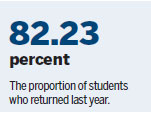Budding businesspeople look to develop via new growth sectors
Bioengineering, advanced science and technology, retail, advanced manufacturing, the cultural and creative industry, energy conservation and environmental protection are the most popular sectors for returnees who want to start businesses, according to a report published by the Center for China and Globalization in 2015.
Those sectors are rapidly becoming strong drivers of China's economic transition.
Since 2000, the country has established a number of platforms to build communications with young entrepreneurs returning from overseas.

Gatherings are held at both central and city government level. For example, Dalian, a coastal city in the northeastern province of Liaoning, hosts the annual China Overseas Scholars Innovation Summit in association with the Ministry of Education, the Ministry of Human Resources and Social Security, the Chinese Academy of Sciences and other organizations.
Since it was first held in 2000, the event has become a major platform for returnees in search of business opportunities who want to brainstorm and exchange experiences, and has attracted more than 300,000 participants from 63 countries and 45,000 businesses.
Amending policies and removing barriers are not easy tasks, so, in line with the country's ongoing strategy of encouraging new economic drivers, the government has been paying close attention to problems encountered by would-be entrepreneurs.
In June last year, the State Council, China's Cabinet, noted that students returning from overseas and hoping to start businesses face many obstacles. They include problems in accessing funding and obtaining permanent residence equivalent to the hukou household registration system, applications for Intellectual Property Rights, and a number of policy restrictions.
In a written guideline, Premier Li Keqiang urged the relevant ministries to work together to provide more opportunities for budding entrepreneurs and startups. In response, 18 ministries looked into the issues.
In April, the State Council issued a raft of incentives to help returnees start businesses. One major incentive encourages returnees to cofound businesses by granting intangible assets, such as intellectual property rights. Other measures include a more-streamlined process in education certification and related services, and returnees with high-grade experience are provided with greater convenience when applying for permanent residence.
In April, Yang Tao, vice-minister of the Ministry of Human Resources and Social Security, said 432,500 people returned from overseas last year, and the proportion of Chinese students who returned to China after overseas study rose to 82.23 percent last year from 72.39 percent in 2015.
(China Daily 08/09/2017 page6)









